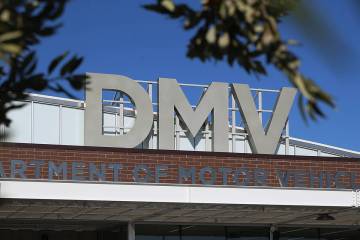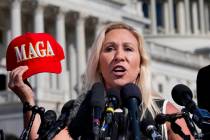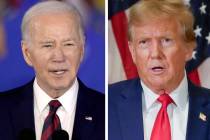Rep. Lee bipartisan bill aimed at boosting child care
WASHINGTON — A bipartisan House bill aimed at easing the shortage of child care centers by providing Small Business Administration loans to run them was hailed Thursday by national and state education and children’s advocacy groups as a common-sense solution that will benefit working families.
The bill, filed by Rep. Susie Lee, D-Nev., and Rep. Pete Stauber, R-Minn., would make the same small-business loans that for-profit child care providers receive available to non-profit operations so they can expand to meet the growing need for facilities and educational programs.
Lee said more than half of American families lack access to affordable child care. In Nevada, Lee said two out of three children live in homes where parents work full time.
“Because most families don’t have nearly enough affordable child care options, juggling a full-time job and caring for your kids becomes almost impossible,” said Lee, a member of the House Education and Labor Committee.
Stauber is a member of the House Small Business Committee, which will have authority over the legislation.
A similar bill was filed in the Senate last year by Sen. Jacky Rosen, D-Nev., and Sen. Joni Ernst, R-Iowa.
Currently, non-profit child care providers cannot access the same Small Business Administration loans that for-profit businesses receive.
The bill would allow non-profit providers to receive loans of up to $50,000 to maintain, construct and expand facilities, but not to purchase real estate or pay down existing debt.
Funding made available in the bill could also go for pre-kindergarten and other educational programs.
Children and education advocacy groups said the simple legislative fix would go along way toward meeting the growing need of care centers.
Across the country, a shortage of child care businesses leaves many families struggling to find a provider in their community that fits their needs, work schedule and budget, the Bipartisan Policy Center said in a statement.
“Providing child care is an expensive business, and the number of child care providers has been decreasing over the last several years,” the center’s statement read.
Other national groups, as well as such state organizations as the Children’s Advocacy Alliance Nevada and Guinn Center for Policy Priorities Nevada have endorsed the legislation.
They recognized Lee and Stauber for working across the political aisle to fix a problem that affects many families.
Nancy Brune, executive director of the Guinn Center for Policy Priorities in Nevada, said the legislation is a common sense solution that can expand “affordable child care options for Nevada.”
More than 65 percent of Nevada children up to age 5, or about 136,000 kids, live in homes where both parents work, said Denise Tanata, Children’s Advocacy Alliance of Nevada executive director.
“Nevada’s licensed early childhood capacity only meets the needs of about 35 percent of those kids,” Tanata said. “Our non-profit providers can be a viable solution to increasing capacity.”
Contact Gary Martin at gmartin@reviewjournal.com or 202-662-7390. Follow @garymartindc on Twitter.






























